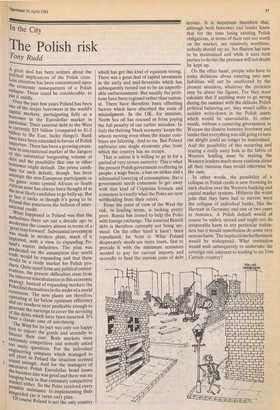In the City
The Polish risk
Tony Rudd
A great deal has been written about the Political implications of the Polish crisis. Less attention has been concentrated upon the economic consequences of a Polish collapse. These could be considerable, to put it mildly. Over the past few years Poland has been one of the major borrowers in the world's Capital markets, participating fully as a borrower in the Eurodollar market in Particular. Their external debt to the West is currently $25 billion (compared to $1-2 billion to the East, lucky things!). Bank lines have been extended in favour of Polish importers. There has been a growing awareness in international market of the dangers of this substantial burgeoning volume of debt and the possibility that one or other borrower might default. The prime candidate for such default, though, has been amongst the non-European participants in the game: some central African or South African state has always been thought of as the most likely candidate to go belly up. But in fact it looks as 'though it's going to be Poland that punctures the balloon of international credit. What happened in Poland was that the authorities there set out a decade ago to niodernise the country almost in terms of a great leap forward'. Substantial investment :.tvas made in modern plant, much of it Ii11113Yrted 1.1", with a view to expanding Po "'s export industries. The plan was Predicated on the assumption that world trade would be expanding and that there would be a ready market for Polish products, Quite apart from any political considerations, the present difficulties stem from the inherent miscalculation in this economic strategy. Instead of expanding markets the Poles find themselves in the midst of a world reeeession. The new plants are therefore operating at far below optimum efficiency and are nowhere near profitable enough to generate the earnings to cover the servicing of the debts which have been incurred. If s been a classic case of mis-timing. The West for its part was only too happy f!rst to export the goods and secondly to finance their cost. Both markets were extremely competitive and nobody asked too many questions. For the individual engineering company which managed to sell Plant to Poland the situation seemed sound enough. And for the managers of successive Polish Eurodollar bond issues the business also was good and there was no hanging back in that extremely competitive market either. So the Poles received every Possible assistance in implementing their misguided (as it turns out) plan. Of course Poland is not the only country which has got this kind of equation wrong. There was a great deal of capital investment in the early and mid-Seventies which has subsequently turned out to be an unprofitable embarrassment. But usually the problems have been regional rather than national. There have therefore been offsetting factors which have absorbed the costs of misjudgment. In the UK, for instance, North Sea oil has rescued us from paying the full penalty of our earlier mistakes. In Italy the thriving 'black economy' keeps the wheels moving even when the major cornbines are faltering. And so on. But Poland embraces one single economic plan from which the country has no escape.
That is unless it is willing to go in for a period of very severe austerity. This is what the present Polish government is offering its people: a wage freeze, a ban on strikes and a substantial lowering of consumption., But a government needs consensus to get away with that kind of Crippsian formula and consensus is exactly what the Poles are now withholding from their rulers. From the point of view of the West the risk, in lending terms, is looking pretty poor. Russia has ceased to help the Poles with foreign exchange. The external British debt is therefore currently not being serviced. On the other hand it hasn't been repudiated, far from it. What Poland desperately needs are more loans, first to provide it with the minimum resources needed to pay for current imports and secondly to fluid the current costs of debt service. It is important therefore that, although both borrower and lender know that for the time being existing Polish obligations, in terms of their real net worth on the market, are relatively worthless, nobody should say so. An illusion has now to be maintained and while it suits both parties to do this the pretence will not doubt be kept up.
On the other hand, people who have to make decisions about entering into new liabilities will not be unaffected by the present situation, whatever the pretence may be about the figures. For they must calculate that if anything were to go wrong during the summer with the delicate Polish political balancing act, they would suffer a sudden write-down in the Polish assets which would be unavoidable. In other words, without a conniving government in Warsaw the illusion between borrnwer and lender that everything was still going to turn out alright could no longer be maintained. And the possibility of this occurring and tearing a really nasty hole in the fabric of Western lending must be making the Western lenders much more cautious about all their business than would otherwise be the case.
In other words, the possibility of a collapse in Polish credit is now throwing its dark shadow over the Western banking and capital market systems. Hitherto the worst jolts that they have had to survive were the collapse of individual banks, like the • Herstatt in Germany and one or two cases in America. A Polish default would of course be widely spread and might not do irreparable harm to any particular institution but it would nonetheless do some very serious harm. The implications furthermore would be widespread. What institution would wish subsequently to undertake the soverign risk inherent in lending to an Iron Curtain country?






































 Previous page
Previous page